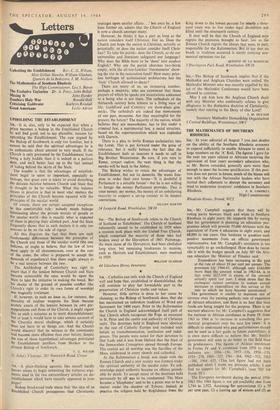SIR.— A plain-thinking agnostic like myself hardly knows where to
begin untwisting the tortuous argu- Ments used in the two extraordinary articles on dis- establishment which have recently appeared in your Pages!
Bishop Stockwood truly states that 'the idea of an Established Church presupposes that Christianity
impinges upon secular affairs ...' but even he. a few lines further on, admits that the Church of England is now a church amongst many.
However, he thinks it has a part as long as the nation considers itself Christian. Just so. Does the Church just hope the nation is Christian, actually or potentially, or does the nation consider itself Chris- tian? To take his points: does the Church, or do our universities and literature safeguard our language? Why does the Bible have to be 'done' into modern English? Why are the parish churches two-thirds empty, with the all-too-familiar 'thermometer' show- ing the rise in the restoration fund? How many price- less heritages of ecclesiastical architecture has the 'State' Church allowed to decay?
There are many of us, an increasing number, perhaps a majority, who are convinced that those prayers of which he speaks are incantations addressed to a being who is not there. The cathedrals of the thirteenth century bore witness to a living view of life: Guildford and Coventry are show-place gim- micks. The cathedrals are indeed fine monuments of our past, museums. Are they meaningful for the present, the future? The majority of the nation, which believes they are mausoleums, has to live under a criminal law, a matrimonial law, a social structure, based on the supernaturalism which was exploded with Darwin.
There is a plea to invite Roman ecclesiastics into the Lords. This is put forward under the guise of tolerance, but it really betrays the fact that the Establishment feels so insecure it needs to call in Big Brother Westminster. Be sure. if you turn to Rome, semper eadem, the next thing is that the monks will be back in the Abbey.
The Bishop wishes to retain the advantages of Establishment, but not its demerits. He wants free- dom to order their own house—qt is doubtful if Parliament is a suitable forum'—but he is not willing to forego the money Parliament provides. That is your money, my money, the money of an unbelieving majority to support a set-up counter to its deepest convictions.
GILLIAN HAWTIN
54 Leopold Road, Wimbledon, SW19




























 Previous page
Previous page